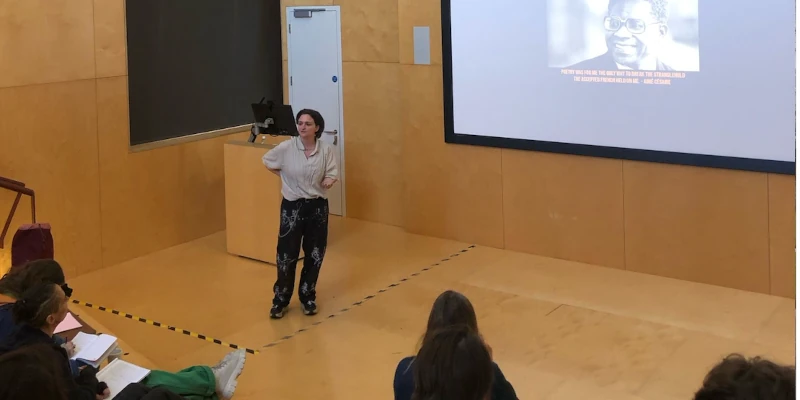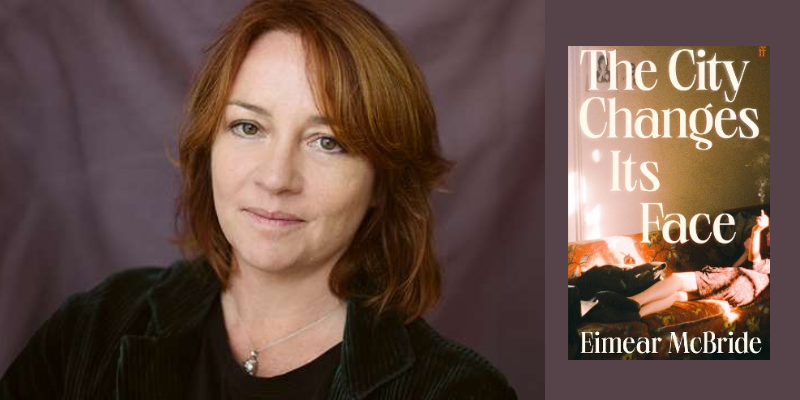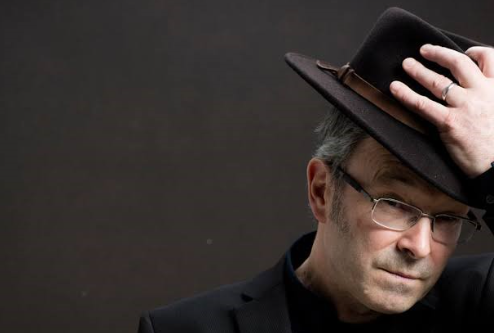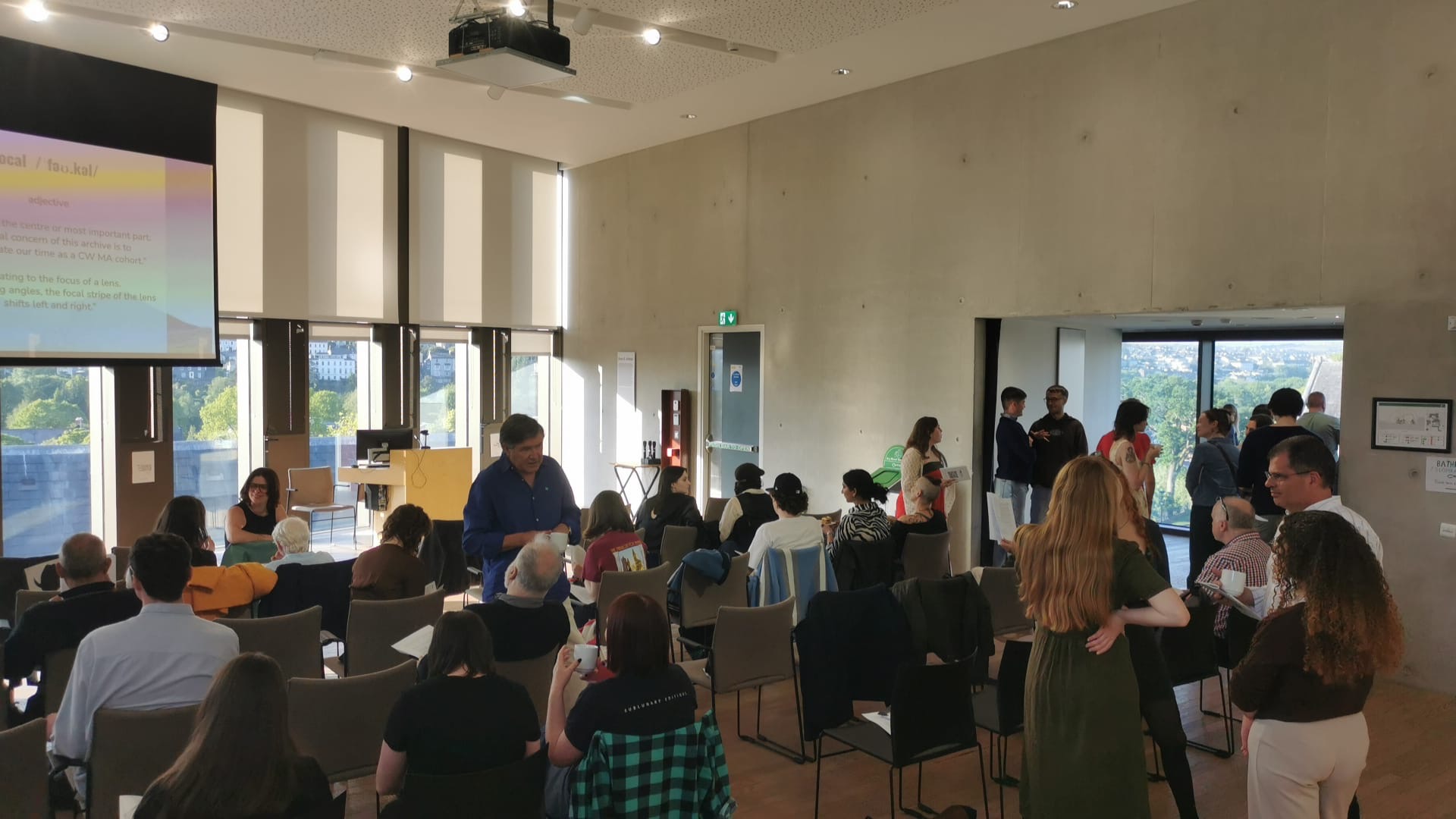On the 9th of May, UCC MA in Creative Writing students celebrated the launch of their website FocalArchive.com in the Dora Allman Room at UCC.
Read moreIn This Section
- English
- About the Department
- People
- Study
- Research
- News
- Media Gallery
- Edmund Spenser in Cork - School of English UCC
- Mary Breen: Pride and Prejudice
- MA in Irish Writing and Film
- Ann Coughlan: The Irish Influence on America's Greatest Abolitionist
- MA in Modernities: Romanticism, Modernism, Postmodernism
- MA in American Literature and Film
- MA in English Texts and Contexts: Medieval to Renaissance
- PhD in English
- Prof. Claire Connolly
- Tonio Colona - PhD in the School of English, UCC
- Prof Patricia Coughlan
- Mike Waldron - PhD in the School of English
- Ken Rooney and Heather Laird Book Launch
- School Welcome Event September 2014
- Contemporary American Trauma Narratives Book Launch
- Staged Transgressions in Shakespeare's England
- Seamus Heaney Memorial Event September 2013
- Creative Writing
- Current Students
- Student Achievements
- Digital Humanities
- Creative Writing
Writing and Politics During Times of Revolution and Catastrophe

Last month, the MA Creative Writing Cohort were joined by award-winning poet, playwright, essayist, short story writer and political activist of British Syrian Heritage, lisa luxx, for a personalised masterclass. luxx's work has been described as "vigorously intellectual and politically febrile" (Poetry Review) and "tender, political, simultaneously exuberant and mournful, and loving populated with family of every definition" (Safia Elhillo). Their work primarily explores revolutionary poetics, queer theory and diasporic narratives, and this masterclass saw both critical and creative explorations on the theme of necessary literature: writing and politics during times of revolution and catastrophe.
Here you can find some beautifully articulated student responses to the event:
"luxx hosted a phenomenal masterclass last week! Their passion for language and the different ways in which we can utilize it on the page was inspiring and thought provoking. I especially appreciated luxx taking the time to get to know us and our interests. This prompted the exploration of “How to Tame a Wild Tongue,” by Gloria Anzaldua, a text that resonated with me, as a Latinx woman, and what I try to achieve with my writing. The creative exercises luxx assigned bred unexpected but powerful results, a testament to the supportive environment they fostered. I left the masterclass with a journal full of recommended reading and writing prompts that will be able to guide my practice."
"lisa luxx made me feel immediately safe and I never felt uncomfortable or pressured to say anything or participate if I didn't feel I wanted to. The workshop itself was very inspiring and informative and it opened up some new avenues for me in terms of how I can write and what I can write about. What specifically resonated with me was the idea of gestures and how we can communicate with our people through a secret language, or a language that is just for us. As a Maltese writer I am aware of the historical baggage that comes with writing in the coloniser's language and this workshop got me thinking about the ways I can implement Maltese language/gestures/signs in my writing without being concerned that some readers will not understanding it fully; the people who'll get it are the people I should aim to write for."
"The discourse on gestures in literature and how they can be used to communicate with people from our own community really resonated with me and especially the part that discussed language and how there are many different iterations of one language (e.g. english)"
"I very unfortunately had to leave early, but I absolutely loved what I was able to stick around for. luxx is a very engaging person, who creates an incredibly welcoming environment. I'm a very anxious person but I felt quite comfortable in the masterclass. The only little thing I regret would be not contributing more but that's entirely on me. They seem genuinely interested in people, and they really made use of the space that they had which was awesome - it makes me feel very sort of uneasy when lecturers or seminar leaders don't move at all. Exploring who my people are was a really fun exercise too, I found that mostly it was pockets of people, so my grandparents, a few people from the local music scene, one or two people from school. I like that my people are very different from one another, it's reassuring to me that I'm not only confining myself to one world or one life. Taking the time to appreciate this, and my people themselves, felt very positive and productive. The term "dream language" to refer to symbols has stuck with me, I found it really striking. I loved the exploration of symbols and the importance of not letting them end up serving capitalism as opposed to the people who made them. I grew up in Ireland so I'm very familiar with Irish rebel songs and poetry, but on a more international stage I hadn't really heard or read much so I really appreciated the opportunity to do that too. It was the first masterclass I've ever attended, and I enjoyed it a lot. Very grateful for the experience."
lisa luxx is an award-winning poet, playwright, essayist, short story writer and political activist of British Syrian Heritage. luxx’s work is broadcast on Channel 4, BBC Radio 4 and TEDx. Their poetry, short stories and essays are published worldwide, in anthologies and literary journals including by Penguin Books and New England Review. As playwright and director, they are behind the following theatre shows: Eating the Copple Apple, what the dog said to the harvest and The Moon is Listening from Dawn til Dusk. luxx guest lectures on revolutionary poetics and queer theory and works as a lyricist with LA-based Marison Arts. They are a long-time transnational community organiser, having co-founded both eLaa Beirut and Nehna Hone. Their debut poetry collection, fetch your mother’s heart, is an examination of the tender violence that pools in all our states of wanting; from our intimacies to our uprisings. It searches the grief of our longing, from the eyes of displacement; carrying their experience in foster care, adoption, and as a mixed-heritage daughter of the Arab diaspora.

Eimear McBride To Read At UCC, March 20th
We’re delighted to announce that, on March 20th, acclaimed, award-winning author Eimear McBride will come to UCC, with a public event to mark the arrival of her new novel, The City Changes Its Face.
Eimear McBride is the author of four novels: A Girl is a Half-formed Thing, The Lesser Bohemians, Strange Hotel and The City Changes Its Face. She has won the Women’s Prize for Fiction, the Goldsmiths Prize, the Kerry Prize, and the James Tait Black Memorial Prize. She also held the inaugural Creative Fellowship at the Beckett Research Centre, University of Reading. Widely recognised as one of the most important writers working in English, she and her work have been described as follows:
‘A writer of remarkable power and originality’ Times Literary Supplement
‘A writer for whom language is an end not a means, a beginning not an end’ Jeanette Winterson
‘One of our major novelists’ The Guardian
‘Something of a genius’ Sebastian Barry
The City Changes Its Face is an intense story of passion, jealousy and family from a trail-blazing writer. A rainy Camden night, December 1996. Twenty-year-old Eily and forty-year-old Stephen retrace the course of their two-year love affair in search of what’s gone wrong. Is it Stephen’s reconnection with his long-lost teenaged daughter, Grace? Or that he’s a well-known actor while Eily’s still at drama school? Maybe the autobiographical film he’s just made has brought his old demons back to the surface? Or perhaps Eily’s youth has led her into a mistake she doesn’t know how to fix? Intimate, experiential and immersive, this is the story of what happens when it’s love beyond question, but trouble comes along anyway.
Please join us on March 20th, 6.30pm at the Dora Allman Room, The Hub, UCC to witness Eimear perform from her new novel, with discussion afterwards. The event is free to attend, but ticketed. To make sure of a seat, please reigster via Eventbrite: https://www.eventbrite.ie/e/eimear-mcbride-the-city-changes-its-face-tickets-1266962893119?aff=oddtdtcreator.
The School of English & Digital Humanities is thrilled to welcome two new Lecturers in Creative Writing to the Creative Writing Programme team: Eimear Ryan and Rosa Rogers.
Eimear Ryan is the author of a novel, Holding Her Breath (Penguin Sandycove, 2021), and a memoir, The Grass Ceiling (Penguin Sandycove, 2023). Other writing has appeared in Granta, The Dublin Review, The Stinging Fly, Winter Papers, Lit Hub, and elsewhere. She is a co-founder and editor of Banshee literary journal and its publishing imprint, Banshee Press. From Co. Tipperary, she now lives in Cork city.
Dr Rosa Rogers (she/her) is an Anglo-Irish writer and interdisciplinary artist, originally from Yorkshire. She holds a PhD in The Contemporary Novel for her forthcoming debut, Composition, which explores the coming-of-age tale of a working-class daughter of the Irish diaspora. Her writing has been published widely, including Flash Fiction North, A Personal Anthology, The Menteur, and The Mersey Review, and her multimedia projects have been exhibited at The Photographers' Gallery (London), Reid Hall (Paris), and as part of The Bookshop Podcast's Creative Series (Ojai, California). She is the founder of Poetry Etc, Tales of a Town and former Co-Director of Vortex Gallery, where she has spent nearly a decade advocating in community settings for increased access to arts and literary education.
Eimear and Rosa are brilliant additions to the creative writing team, and are delivering creative writing modules across undergraduate and postgraduate English studies at University College Cork. You can learn more about creative writing at UCC here.
Acclaimed Author Mike McCormack To Read at UCC on October 7th

The School of English and Digital Humanities at UCC is thrilled to announce that acclaimed author Mike McCormack will read at an exclusive, open-to-the-public event at UCC on October 7th, 6.30pm.
Mike McCormack is an award-winning Irish novelist and short-story writer. He was raised on a farm in County Mayo, and has published two collections of short stories, Getting It In the Head and Forensic Songs, and four novels — Crowe's Requiem, Notes from a Coma, Solar Bones, and This Plague of Souls.
In 1996, he was awarded the Rooney Prize for Irish Literature. In 1998, Getting It In the Head was voted a New York Times ‘Notable Book of the Year’. In 2006, Notes from a Coma was shortlisted for the Irish Book of the Year Award, and is currently on the Senior Cycle reading list for Leaving Certificate English. In 2016, Solar Bones (a book in a single sentence) won the Goldsmiths Prize, was long-listed for the Booker Prize, was named "Novel of the Year" by the Irish Book Awards, and won the Dublin International Literary Award (previously known as the IMPAC). His latest novel, This Plague of Souls, follows a painter named Nealon as he returns home from prison and sets out to find his wife and child amid brewing global unrest.
Described as ‘a disgracefully neglected writer’ early in his career, the success of his later work has asserted him as one of the great Irish novelists. Over the years, his cutting edge work has been adapted for the screen and the stage. He lives in Galway with his wife, the artist Maeve Curtis, and their son, and is the Director of the University of Galway’s MA in Creative Writing.
We are delighted to welcome Mike to UCC on October 7th (6.30pm) for a public reading and discussion of his superb work.
Where: Dora Allman Room, The Hub, UCC Main Campus
When: October 7th, 6.30pm
Booking: Tickets are free, and all are welcome, but to ensure a seat register for this event at the following link: https://www.eventbrite.ie/e/mike-mccormack-at-ucc-public-reading-discussion-tickets-1015172497267
Creative Writing
Contact us
O'Rahilly Building, University College Cork, Cork, Ireland.,
- Danny Denton, Interim Director, Creative Writing - danny.denton@ucc.ie
- Liz Quirke, Lecturer, Creative Writing - lquirke@ucc.ie

